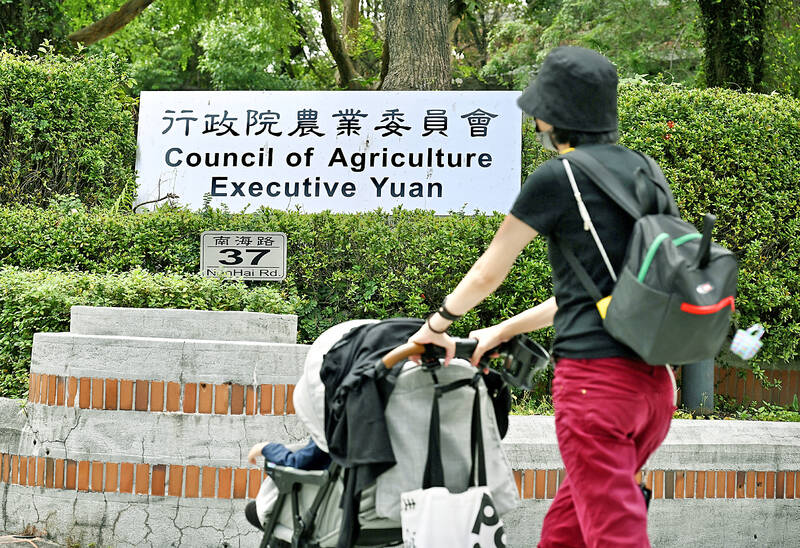The Council of Agriculture yesterday was upgraded to the status of a ministry, after the Organization Act of the Ministry of Agriculture (農業部組織法案) passed a third reading at the legislature in Taipei.
National Taiwan University Department of Agricultural Economics professor Chang Hung-hao (張宏浩) said that agricultural officials would now have more authority, and that the new ministry’s greatest challenge would be tackling import and export-related issues.
“Many matters in the agricultural field require consultation and cooperation across the economics, health and environment ministries, and now agriculture officials will be able to communicate with those ministries on an equal footing,” Chang said.

Photo: Lo Pei-de, Taipei Times
It has been 35 years since the peasant movement on May 20, 1988, when farmers protested government plans to expand imports of agricultural products from the US, he said, adding that the establishment of the Ministry of Agriculture was the most significant milestone in the industry since then.
Yen Huai-shing (顏慧欣), deputy executive director of the Taiwan WTO & RTA Center at the Chung-Hua Institution for Economic Research, said the upgraded ministry would be better able to integrate the resources of relevant government departments and would coordinate horizontally across government agencies more efficiently.
When market liberalization policies threaten farmers’ income, the ministry would be able to allocate more resources to help farmers, including assisting them to adjust their crops and make other arrangements to help them with the transition, Yen said.
“The Ministry of Agriculture will be better prepared for external negotiations and countermeasures, and it will also be able to allocate more resources to handling international affairs,” she said. “If Taiwan wants to integrate more into the regional economy, other nations will inevitably ask Taiwan to accept more imported food items.”
Importing more food items would involve more work, such as quarantine measures to prevent the import of pests and diseases, and administrative review of documents, all of which would require the greater resources of a ministry, she added.
Other areas would require more resources, too, such as cooperation between the Ministry of Agriculture and the Ministry of Health and Welfare in the field of nutrition, Chang said, adding that the new ministry would need time to acquire all of the personnel it would need for its new roles.
The legislature yesterday also passed amendments to the Organic Act of the Ministry of Transportation and Communications (交通部組織法) to elevate the status of the Tourism Bureau and the Central Weather Bureau (CWB) into departments, entitling them to a larger budget and workforce to advance their goals.
CWB Director-General Cheng Ming-dean (鄭明典) said the organizational upgrade would help the bureau expand beyond traditional weather forecasting into areas such as climate change research.
Tourism Bureau Director-General Chang Shi-chung (張錫聰) said the move would allow the bureau to hire more employees in Taiwan and internationally, and better achieve the goals laid out in the tourism policy white paper.
Additional reporting by CNA

Several Chinese Nationalist Party (KMT) officials including Chairman Eric Chu (朱立倫) are to be summoned for questioning and then transferred to prosecutors for holding an illegal assembly in Taipei last night, the Taipei Police said today. Chu and two others hosted an illegal assembly and are to be requested to explain their actions, the Taipei City Police Department's Zhongzheng (中正) First Precinct said, referring to a protest held after Huang Lu Chin-ju (黃呂錦茹), KMT Taipei's chapter director, and several other KMT staffers were questioned for alleged signature forgery in recall petitions against Democratic Progressive Party (DPP) legislators. Taipei prosecutors had filed

Taiwan would welcome the return of Honduras as a diplomatic ally if its next president decides to make such a move, Minister of Foreign Affairs Lin Chia-lung (林佳龍) said yesterday. “Of course, we would welcome Honduras if they want to restore diplomatic ties with Taiwan after their elections,” Lin said at a meeting of the legislature’s Foreign Affairs and National Defense Committee, when asked to comment on statements made by two of the three Honduran presidential candidates during the presidential campaign in the Central American country. Taiwan is paying close attention to the region as a whole in the wake of a

NEW WORLD: Taiwan is pursuing innovative approaches to international relations through economics, trade and values-based diplomacy, the foreign minister said Taiwan would implement a “three-chain strategy” that promotes democratic values in response to US tariffs, Minister of Foreign Affairs Lin Chia-lung (林佳龍) said. Taiwan would aim to create a “global democratic value chain,” seek to capitalize on its position within the first island chain and promote a “non-red supply chain,” Lin was quoted as saying in the ministry’s written report to the Legislative Yuan submitted ahead of the legislature’s Foreign Affairs and National Defense Committee meeting slated for today. The Ministry would also uphold a spirit of mutual beneficial collaboration, maintaining close communication and consultations with Washington to show that Taiwan-US cooperation

Taiwan and the US have begun trade negotiations over tariffs imposed by US President Donald Trump earlier this month, Minister of Foreign Affairs Lin Chia-lung (林佳龍) said in an interview this morning before reporting to the Legislative Yuan’s Foreign Affairs and National Defense Committee. The Taipei Economic and Cultural Representative Office (TECRO), Taiwan’s de facto embassy in the US, has already established communication channels with the US Department of State and the US Trade Representative (USTR), and is engaging in intensive consultations, he said. Points of negotiation include tariffs, non-tariff trade barriers and issues related to investment, procurement and export controls, he